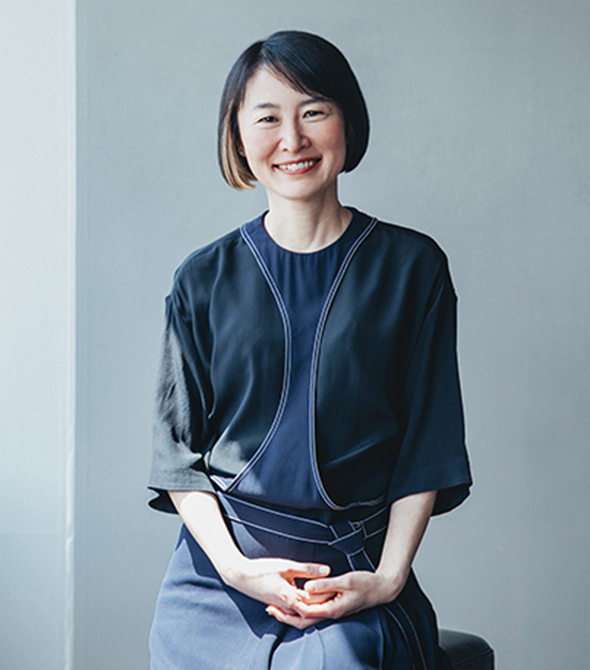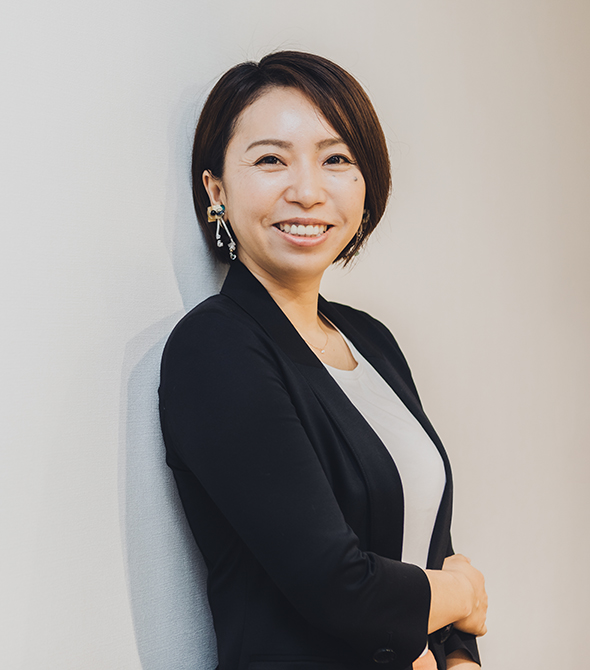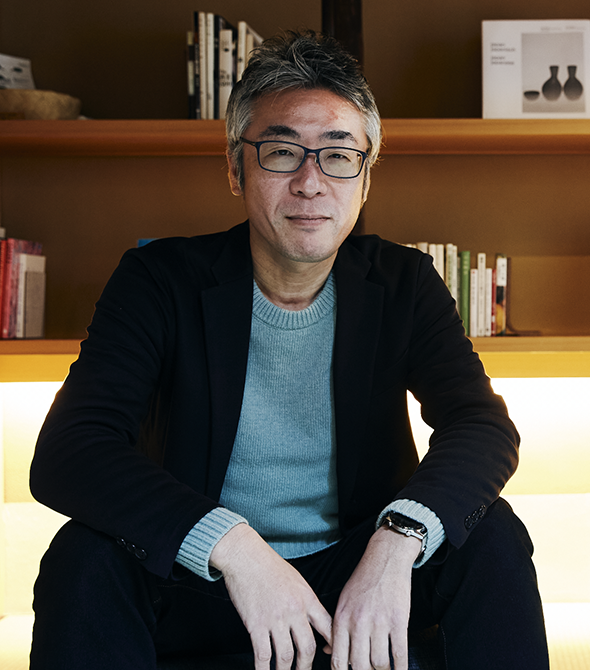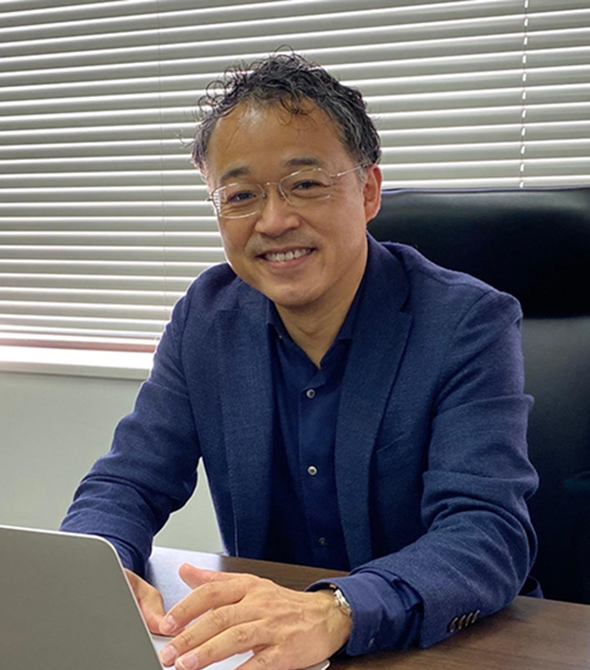Special feature:
“Work and Learning: How I’ll Live Tomorrow – It’s Interesting in an Era Where There Are No Correct Answers”
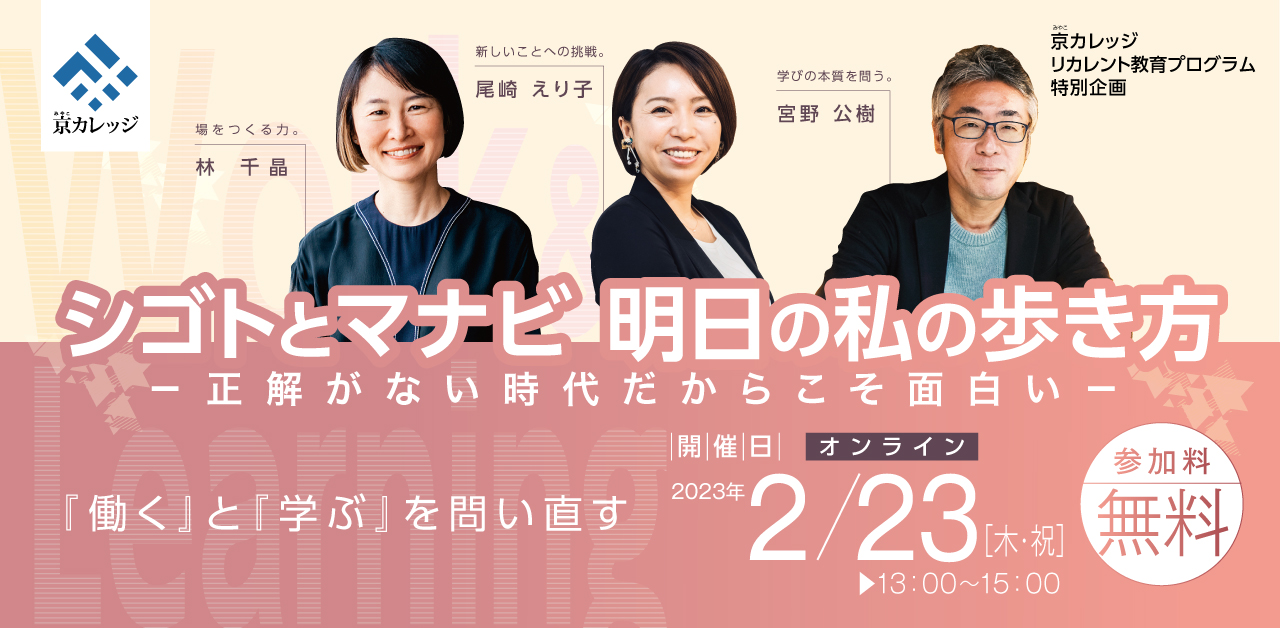
The University Consortium Kyoto launched a “Recurrent Education Program” in 2022 aimed at working adults who wish to study while working. In preparation for the implementation of each program in 2023, we have decided to hold a special event to make learning more accessible to working generations.
This event will provide an opportunity for participants to reexamine the meaning of “work” and “learning” as we live in the “VUCA era,” an era in which the future is difficult to predict and the environment is rapidly changing.
Through the speakers’ lectures and discussions, we hope you will gain a sense of the excitement of taking on new challenges and the importance of proactively learning while working. Let’s create an opportunity to change your life starting tomorrow together. We look forward to your participation.
| schedule | February 23, 2023 (Thursday/Holiday) 13:00-15:00 |
| How the event will be held | Online (Zoom webinar) |
| Participation fee | free |
schedule
13:00-14:00
| Lecture 1 | The power to create spaces! Visiting undiscovered regions Chiaki Hayashi (CEO, Q0 Co., Ltd.) |
| Lecture 2 | Taking on new challenges! Throwing things away, being ashamed, going crazy – Eriko Ozaki (CEO, Shinhenryaku Co., Ltd.) |
| Lecture 3 | Questioning the Essence of Learning! What is Learning? Mr. Kimiki Miyano (Associate Professor, Center for the Promotion of Interdisciplinary Education and Research, Kyoto University) |
14:00-15:00
Dialogue theme: Work and Learning How I’ll Walk Tomorrow
| Speakers: Chiaki Hayashi (CEO, Q0 Inc.), Eriko Ozaki (CEO, Shinsenryaku Inc.), Kimiki Miyano (Associate Professor, Center for the Promotion of Interdisciplinary Education and Research, Kyoto University) |
| Facilitator: Takeshi Ishikawa (President and CEO of Kiichi Tools Co., Ltd., Recurrent Education Planning Committee Member, University Consortium Kyoto) |
The event flyer can be downloaded here (PDF)
How to apply
Applications for this program have closed.
Introducing our instructors
| full name | Chiaki Hayashi, Representative Director and President of Q0 Co., Ltd. |
| Biography | After working for Kao, he founded Loftwork Inc. in 2000, serving as its representative director and chairman until 2022. After retiring, he founded Q0 Inc. Based in regions such as Akita and Toyama, he aims to create designs that represent the times and are “inherited regions.” He has served as a judge for the Good Design Award and on the Ministry of Economy, Trade and Industry’s “Study Group on Industrial Competitiveness and Design.” He also serves as chairman of the board of directors of Hida no Mori de Kuma wa Odoru Inc., which aims to create local industries through forest regeneration and manufacturing. |
| full name | Eriko Ozaki, CEO of Shinsenryaku Co., Ltd. |
| Biography | I have a personality that makes me want to try something new every two years. After giving birth to two children, I started my own business in 2014 → launched a new business in 2016 → managed multiple stores and attended a comedy training school for a year in 2018 → in 2020, while still working as a business owner, I became a civil servant in the Education Guidance Division of Ikoma City, Nara Prefecture → in 2022, I moved from Nagareyama City, Chiba Prefecture to a village in Okayama Prefecture. |
| full name | Mr. Kimiki Miyano Associate Professor, Center for the Promotion of Interdisciplinary Education and Research, Kyoto University |
| Biography | Associate Professor at the Center for Promoting Interdisciplinary Education and Research, Kyoto University. Graduated from the College of Science and Engineering, Ritsumeikan University, and completed his doctoral studies at the same university. After graduating from McMaster University, Ritsumeikan University, and Kyushu University, he has held his current position since 2011. He has also worked as an academic advisor to the president of Kyoto University and an academic researcher at the Ministry of Education, Culture, Sports, Science and Technology. He is a director of the Japan Society for Research and Innovation, and representative director of the STEAM Association, a general incorporated association. His most recent book is “How to Ask Questions” (Chikuma Shinsho), published in February 2021. |
| full name | Takeshi Ishikawa, President and CEO of Kiichi Tools Co., Ltd., Recurrent Education Planning Committee Member, University Consortium Kyoto |
| Biography | Born in Osaka in 1966. After graduating from the Faculty of Law at Doshisha University in 1990, he worked at Toyo Trust Bank (now Mitsubishi UFJ Trust and Banking Corporation) and served as Representative Director of Sankyo Seiki Co., Ltd., before joining Kiichi Tools Co., Ltd. as Vice President in 2022. He became Representative Director and President of the company in 2023. He has also served as a member of the University Consortium Kyoto Recurrent Education Committee since 2018. He completed the Kyoto University ELP program in 2018 and is currently enrolled in the Master’s program at the Doshisha University Graduate School of Policy and Management from 2022. |
2022 Recurrent Education Program
: “Modern Liberal Arts Course: The Present and Future of Space Migration”
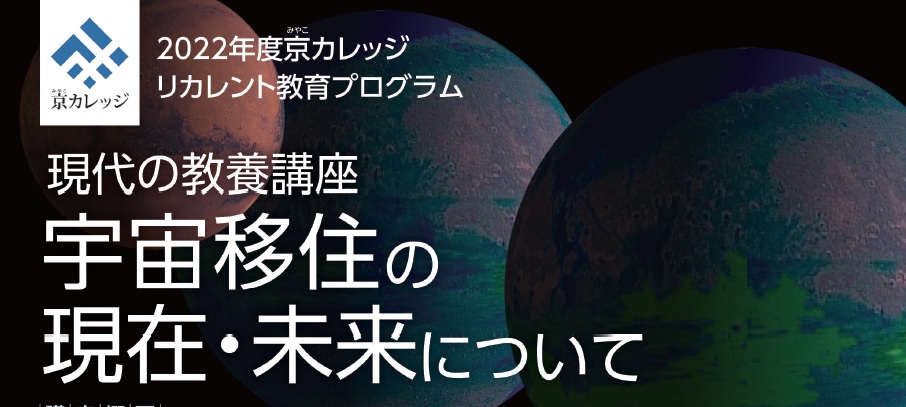
Course outline
In response to the growing demand for re-education among working adults, who say, “Even adults want to learn!”, the University Consortium Kyoto is launching a “Contemporary Liberal Arts Course.” This year’s course, titled “The Present and Future of Space Migration,” will explore cutting-edge knowledge on manned space flight, which is currently attracting worldwide attention, and migration to the Moon and Mars, from a wide range of perspectives, from survival-related issues such as food and shelter to science and technology, medicine, and law. By learning about space, participants will once again realize the importance of the global environment. We hope that all participants will consider what we can do to protect the global environment and in the coming space age.
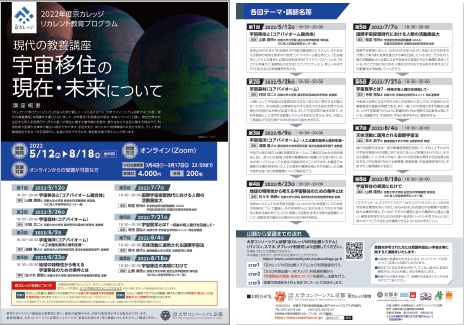
You can download the flyer here.
Course period
Thursday, May 12, 2022 – Saturday, August 18, 2022,
6:30 PM – 8:00 PM (8 sessions in total)
How to start the course
Online (Zoom meeting)
Tuition fee
4,000 yen (8 frames total)
Eligibility
Only those who can take the course online
Event information flyer
“Modern Liberal Arts Lecture: The Present and Future of Space Migration” [PDF]
About the course content
The following will be implemented:
|
Date and Time: Thursday, May 12th, 18:30-20:00 Theme: Space Migration and the “Core Biome Complex” Lecturer: Yosuke Yamashiki, Professor and Department Head, Graduate School of Advanced Integrated Studies in Human Survivability, Kyoto University (Director of the SIC Human Space Research Center) |
| We will define the minimum system capable of “sustaining life” on celestial bodies other than Earth and the representative of the actual Earth ecosystem that supports it as the “core biome complex,” name the technological system necessary to maintain the “life support” system as “core technology,” and refer to a “circular” society that possesses these as the “core society,” and consider a concept for realizing a “space society” on a new celestial body. |
|
Date and time: Thursday, May 26th, 18:30-20:00 Theme: Space Forests (Core Biome) Lecturer: Koji Murata (Associate Professor, Department of Forest Science, Graduate School of Agriculture, Kyoto University) |
| For humankind, space exploration has become a goal of permanent residence rather than an exploration purpose. To achieve this, a sustainable supply of living space and living materials that provide peace of mind is necessary. We believe that a recycling system in which trees are grown in space and wood is used as a resource would be effective. We also consider the possibility of using wood in space, such as in wooden artificial satellites. |
|
Date and time: Thursday, June 9th, 18:30-20:00 Theme: Space Ocean (Core Biome) – Artificial Aquatic Ecosystems and Food Production – Lecturer: Masato Endo (Associate Professor, Department of Marine Biological Resources, Tokyo University of Marine Science and Technology) |
| One way to develop a miniature ocean (aquasphere) in space is to raise individual aquatic organisms and exchange materials such as food and waste between them, which can prevent the collapse of the ecosystem. This course will explain the technology for constructing an artificial ecosystem using multiple aquatic organisms and aquatic food production based on this, particularly fish farming. |
|
Date and time: Thursday, June 23rd, 18:30-20:00 Theme: What are the conditions for space migration considering the unique characteristics of Earth? Speaker: Takanori Sasaki (Assistant Professor, Department of Astrophysics, Graduate School of Science, Kyoto University) |
| How did Earth become a planet that can support life? We will discuss the unique characteristics of Earth as a planet that can support life, and use this knowledge to examine the possibility of habitability on other celestial bodies. Furthermore, we will explore the conditions for solving the various problems that arise when considering space migration from the perspective of planetary science. |
|
Date and time: Thursday, July 7th, 18:30-20:00 Theme: Expanding the sphere of human activity in the era of international space exploration Speaker: Hiromitsu Inatomi (Research Director, Interdisciplinary Sciences Division, Institute of Space and Astronautical Science, Japan Aerospace Exploration Agency (JAXA)) |
| In the field of international space exploration, Japan aims to produce first-class scientific results on the surface of the moon by the 2030s. Furthermore, momentum is building toward the realization of space habitation, which will be necessary for the further expansion of human activity. Therefore, it will become increasingly important to consider the conditions under which a permanent human society can exist in space. |
|
Date and time: Thursday, July 21, 18:30-20:00 Theme: What is space medicine? – Aiming for future manned flights – Lecturer: Masahiro Terada (Associate Professor, Kyoto University, Synergistic Studies for Space Research Unit) |
| As human spaceflight is expected to become more and more popular in the future, astronaut health management is an important issue. In addition, as opportunities for ordinary people to fly in space increase, there is an increasing need to understand how humans are affected by the space environment. This lecture will focus on space medicine and astrobiology. |
|
Date and Time: Thursday, August 4th, 18:30-20:00 Theme: International Space Law Applied to Celestial Activities Lecturer: Setsuko Aoki (Professor, Keio University Law School) |
| With the exception of some arms control provisions, current international space law is largely the same for activities on celestial bodies and other parts of outer space. Keeping this in mind, this book examines the legal systems governing manned and unmanned space activities on celestial bodies. It covers topics such as jurisdiction and registration systems for “space objects,” the law of space resource extraction, and human rights issues in space. |
|
Date and time: Thursday, August 18th, 18:30-20:00 Theme: Towards the realization of space migration Speaker: Yosuke Yamashiki (Professor and Department Head, Graduate School of Advanced Integrated Studies in Human Survivability, Kyoto University (Director of the SIC Human Space Research Center)) |
| We have learned about the space colonization concept, which connects “core biomes” and “core technologies” to “core societies.” Various concepts are underway at NASA, space agencies around the world, and private companies, but we will consider the similarities and differences between these concepts and ours, as well as the technological and economic hurdles to realizing them, and think about when we will be able to build a space society. |
2022 Recurrent Education Program “Data Science Course for Working People”
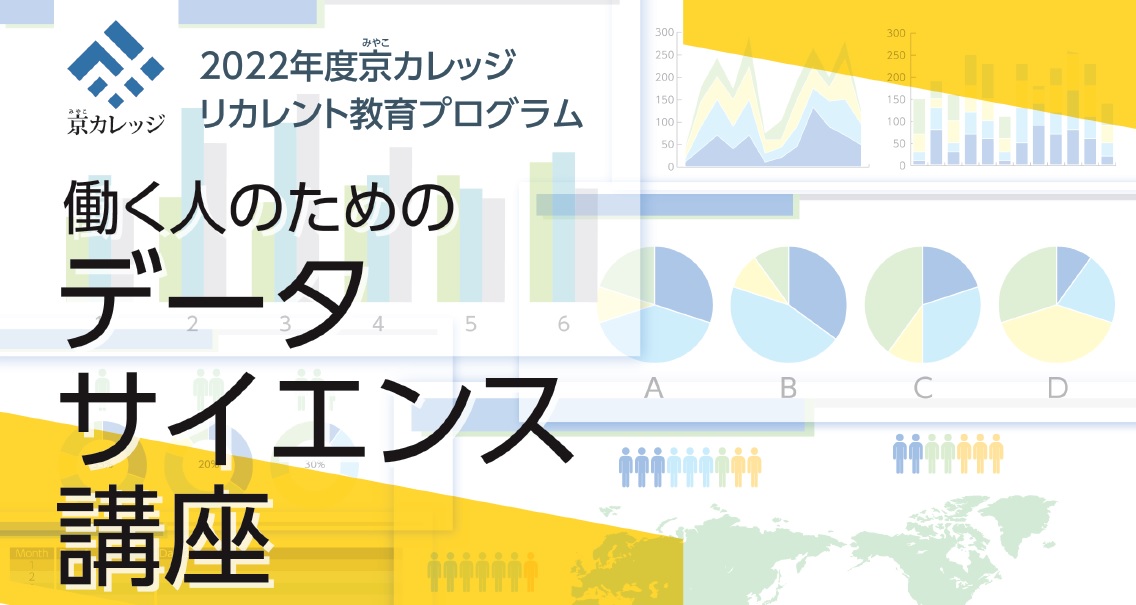
Lecture Summary
Data analysis using big data is attracting attention in various fields. However, there are not many opportunities in the workplace to understand the process of how data is analyzed and utilized and to put it into practice.
In this course, after learning basic statistical methods through case studies, students will use real-life examples to explain how data is collected and analyzed, and will then perform data analysis using actual data. The goal is to deepen students’ understanding of data analysis through this process.
Course period
June 18, 2022 (Sat) – July 16, 2022 (Sat) 10:30 AM – 4:10 PM <3 days, 9 sessions total>
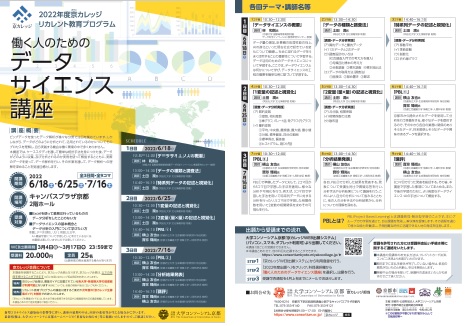
You can download the flyer here.
Location
Campus Plaza Kyoto, 2nd floor hall
(Shimogyo-ku, Kyoto City, Nishinotoin-dori Shiokoji-sagaru)
Tuition fee
20,000 yen (3 days, 9 sessions)
Eligibility
- Those who use Excel for work but have never performed data analysis
- Those who want to learn the basic concepts of data science and an introduction to data analysis
<Note>
Please note that this course is not suitable for those who have already studied data analysis or who wish to learn about AI and machine learning.
Event information flyer
“Data Science Course for Working People” [PDF]
About the course content
The following will be implemented:
|
Theme: “An Overview of Data Science” (1st period) 10:30-12:00 Lecturer: Kazunori Hayashi (Professor, Data Science Innovation Education and Research Center, Institute for International Liberal Arts and Sciences, Kyoto University) |
| This course provides an overview of the changes currently occurring in society, such as the increase in data volume, improvements in computer processing performance, and the evolution of AI, and teaches the importance of making effective use of the data that is overflowing in society. It also covers data science for data utilization. In this course, students will learn what data science is and an overview of the data science process using simple examples. |
|
Theme: “Types of Data and Research Methods” (2nd session) 13:00-14:30 Lecturer: Jun Tsuchida (Assistant Professor, Faculty of Culture and Information Studies, Doshisha University) |
|
<Survey and data analysis practice>(a) Qualitative data and quantitative data (b) Primary data and secondary data (c) The basics of survey design (introducing concepts from an introduction to social research)① Concept of population and sample (random variables not included) ② Complete survey ③ Sample survey ④ Sampling method(d) Data acquisition method (survey method)① Interview method ② Retention method ③ Mailing method |
|
Theme: “Description and Visualization of Time Series Data” (3rd period) 14:40-16:10 Lecturer: Jun Tsuchida (Assistant Professor, Faculty of Culture and Information Studies, Doshisha University) |
|
<Survey and data analysis practice>(a) Moving average (b) Seasonal fluctuation (c) Indexation (d) Line graph |
|
Theme: “Univariate Description and Visualization” (4th period) 10:30-12:00 Lecturer: Jun Tsuchida (Assistant Professor, Faculty of Culture and Information Studies, Doshisha University) |
|
<Survey and data analysis practice> (a) Qualitative variables①Frequency, relative frequency ②Bar graph, Pareto chart, band graph (pie chart)(a) Quantitative variables① Mean, median, mode, maximum, minimum ② Variance, standard deviation, interquartile range ③ Standard score, deviation value ④ Histogram, box plot |
|
Theme: “Description and Visualization of Bivariate (Quantity x Quantity)” <5th period> 13:00-14:30 Lecturer: Jun Tsuchida (Assistant Professor, Faculty of Culture and Information Studies, Doshisha University) |
|
<Survey and data analysis practice> (a) Covariance and correlation coefficient (b) Notes on correlation coefficient (c) Scatter plot |
|
Theme: “PBL①” <6th period> 14:40-16:10 Lecturer: Tomoya Yokoyama (Project Assistant Professor, Graduate School of Life and Environmental Sciences, Kyoto Prefectural University) Lecturer: Teruhisa Bojin (Professor, Department of Information Engineering and Human Sciences, Kyoto Institute of Technology) |
| Prepare to analyze data provided by Kyoto City. A variety of data will be provided, and participants will select data that is relevant to their work, data that may be relevant in the future, or data that interests them. |
|
Theme: “PBL②” <7th period> 10:30-12:00 Lecturer: Tomoya Yokoyama (Project Assistant Professor, Graduate School of Life and Environmental Sciences, Kyoto Prefectural University) Lecturer: Teruhisa Bojin (Professor, Department of Information Engineering and Human Sciences, Kyoto Institute of Technology) |
| The data prepared in PBL① will be subjected to various analyses and visualizations using the methods learned in classes 3 to 5. For example, the method learned in class 3 will be used to analyze time series data, and the correlation coefficient learned in class 5 will be used to find the correlation between two variables and visualize it. |
|
Theme: “Presentation of Analysis Results” (8th session) 13:00-14:30 Lecturer: Tomoya Yokoyama (Project Assistant Professor, Graduate School of Life and Environmental Sciences, Kyoto Prefectural University) Lecturer: Teruhisa Bojin (Professor, Department of Information Engineering and Human Sciences, Kyoto Institute of Technology) |
| Each participant will present the results of their analysis in PBL②. Students will then have a Q&A session about their presentations and discuss their analytical methods and results. This will allow them to reflect on their own analysis and deepen their understanding of analysis by learning from the analytical methods and results of others. |
|
Theme: “Commentary” (9th session) Lecturer: Terunobu Hojin (Professor, Department of Information Engineering and Human Sciences, Kyoto Institute of Technology) Lecturer: Tomoya Yokoyama (Specially Appointed Assistant Professor, Graduate School of Life and Environmental Sciences, Kyoto Prefectural University) |
| This will be a summary of the presentation given in the eighth session. Afterwards, we will summarize what we learned in this course. We will also provide an overview of more advanced data science and AI methods for future study. |














